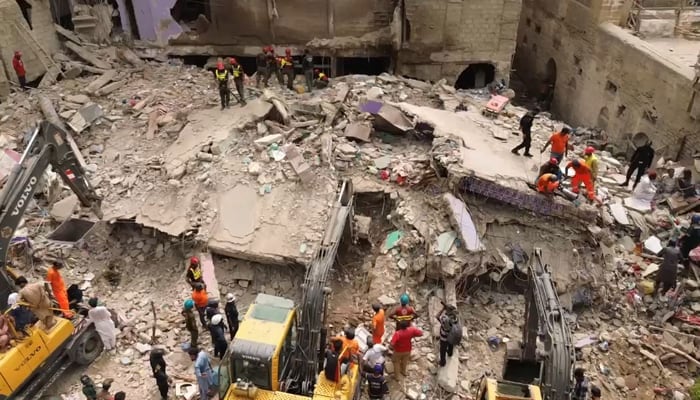Trapped in tragedy

What does it say about a country when it can no longer count buildings collapsing on its people as an exceptional or unexpected event? What does it say that every spell of rain brings with it the risk of this type of event? Or of tourists perishing in a flash flood? Exactly a week after rains led to the latter, they seem to have caused the former as well. Friday morning in Karachi saw the collapse of a five-storey residential building in the city’s underprivileged Lyari area, claiming the lives of at least eight people. The building contained around 20 apartments and, as of writing, rescue services had managed to save at least eight people and were still searching for people trapped under the rubble. Rescue authorities noted that blocked roads and disrupted mobile signals slowed their response and local residents initially began rescue efforts themselves before professional teams arrived. Sadly, the attempts of distressed relatives of the trapped victims to assist rescue workers, inadvertently disrupted operations, as per reports, until Rangers and city wardens could cordon off the area. As was the case in the Swat river tragedy which claimed the lives of at least 12 tourists, the immediate emergency response situation seems to leave a lot to be desired.
But, as was also the case in Swat, this emergency should not have happened in the first place. The Karachi mayor and Sindh Building Control Authority (SBCA) have both said that the building had been previously declared dangerous, with the latter also saying that it had been around for 30 years. There are countries like Singapore that do not allow buildings to stay around for that long. So why did this building still have people living in it if the authorities knew it was dangerous? According to the mayor, when it comes to unsafe buildings, the authorities can either evict the residents forcefully or persuade them to leave and they often pick the latter. He argues that this latest tragedy is proof that people should listen to the authorities. If people are reluctant to leave their homes when those in charge tell them to, it might be because our governments are not exactly great at helping them find new places to live or compensating them for the loss of a home. Many victims of the 2022 floods were homeless well over a year after the calamity. And this is before we even begin to address issues like loss of income and all the other issues that might befall people when they are forced to relocate. The case of the Gujjar and Orangi nullahs is also right before us.
There have to be more choices for underprivileged Pakistanis than just living in a building that might collapse, or falling into destitution. The state is supposed to act as a bridge in such cases to help mitigate the impact of relocation, but this does not appear to be the case. Considering that it is the authorities that are supposed to ensure only safe buildings are built in the first place, people are more than entitled to be compensated. However, even safe buildings are a challenge, with the SBCA disclosing that they are aware of around 578 unsafe buildings in Karachi. A cursory glance at the city’s buildings would indicate a lot more. We are living in a country where those in charge both lay the groundwork for tragedies and crises to occur and then fail to respond to them in an appropriate and effective manner. People whose only mistake is being too poor or too unaware of the dangers they are facing continue to pay the price.
-
 Eric Dane's Girlfriend Janell Shirtcliff Pays Him Emotional Tribute After ALS Death
Eric Dane's Girlfriend Janell Shirtcliff Pays Him Emotional Tribute After ALS Death -
 King Charles Faces ‘stuff Of The Nightmares’ Over Jarring Issue
King Charles Faces ‘stuff Of The Nightmares’ Over Jarring Issue -
 Sarah Ferguson Has ‘no Remorse’ Over Jeffrey Epstein Friendship
Sarah Ferguson Has ‘no Remorse’ Over Jeffrey Epstein Friendship -
 A$AP Rocky Throws Rihanna Surprise Birthday Dinner On Turning 38
A$AP Rocky Throws Rihanna Surprise Birthday Dinner On Turning 38 -
 Andrew Jokes In Hold As BAFTA Welcomes Prince William
Andrew Jokes In Hold As BAFTA Welcomes Prince William -
 Sam Levinson Donates $27K To Eric Dane Family Fund After Actor’s Death
Sam Levinson Donates $27K To Eric Dane Family Fund After Actor’s Death -
 Savannah Guthrie Mother Case: Police Block Activist Mom Group Efforts To Search For Missing Nancy Over Permission Row
Savannah Guthrie Mother Case: Police Block Activist Mom Group Efforts To Search For Missing Nancy Over Permission Row -
 Dove Cameron Calls '56 Days' Casting 'Hollywood Fever Dream'
Dove Cameron Calls '56 Days' Casting 'Hollywood Fever Dream' -
 Prince William, Kate Middleton ‘carrying Weight’ Of Reputation In Epstein Scandal
Prince William, Kate Middleton ‘carrying Weight’ Of Reputation In Epstein Scandal -
 Timothée Chalamet Compares 'Dune: Part Three' With Iconic Films 'Interstellar', 'The Dark Knight' & 'Apocalypse Now'
Timothée Chalamet Compares 'Dune: Part Three' With Iconic Films 'Interstellar', 'The Dark Knight' & 'Apocalypse Now' -
 Little Mix Star Leigh-Anne Pinnock Talks About Protecting Her Children From Social Media
Little Mix Star Leigh-Anne Pinnock Talks About Protecting Her Children From Social Media -
 Ghislaine Maxwell Is ‘fall Guy’ For Jeffrey Epstein, Claims Brother
Ghislaine Maxwell Is ‘fall Guy’ For Jeffrey Epstein, Claims Brother -
 Timothee Chalamet Rejects Fame Linked To Kardashian Reality TV World While Dating Kylie Jenner
Timothee Chalamet Rejects Fame Linked To Kardashian Reality TV World While Dating Kylie Jenner -
 Sarah Chalke Recalls Backlash To 'Roseanne' Casting
Sarah Chalke Recalls Backlash To 'Roseanne' Casting -
 Pamela Anderson, David Hasselhoff's Return To Reimagined Version Of 'Baywatch' Confirmed By Star
Pamela Anderson, David Hasselhoff's Return To Reimagined Version Of 'Baywatch' Confirmed By Star -
 Willie Colón, Salsa Legend, Dies At 75
Willie Colón, Salsa Legend, Dies At 75



